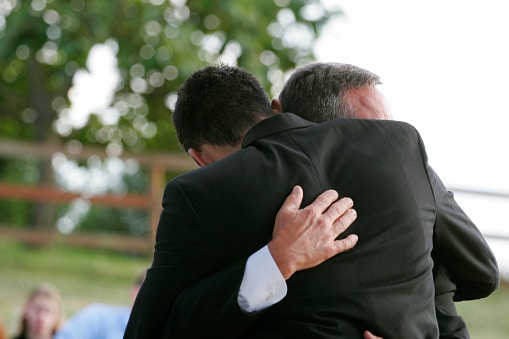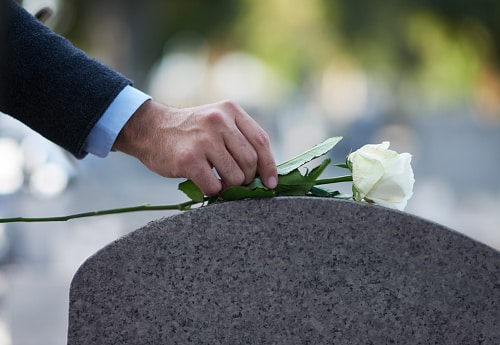
About Funerals – Helpful Facts & Tips After Death
Browse useful information, tips, and guidance about funerals and after death to assist during the planning process for you or your loved one after death.

THE VALUE OF THE FUNERAL
The funeral is the oldest ceremony known to humankind—a leave-taking ritual that involves both care of the dead and care of the living. This rite of passage provides an organized, group-centered opportunity to share the experience of death—to link past and future, to express emotions, to affirm religious and theological beliefs, and to share memories with friends, family and the community.
It is a ritual with many values, but above all … the funeral is a meaningful celebration of a life that has been lived.
WHY HAVE A FUNERAL?
The funeral has long been recognized as a rite of separation that serves many purposes. Viewing of the deceased is an important step in confirming the reality of the death and giving identity to the purpose of the funeral—whether it be a public or a private service.
Death touches more than just the deceased’s loved ones. In fact, it is difficult to know just where to draw the line between who it does and does not affect. A private funeral limits those who may attend, therefore removing the opportunity for those excluded to confirm the reality of death and grieve with others. A public funeral allows a broad mixture of family, friends and the community to share their memories and sorrows, and to support one another.
The funeral, and all the events surrounding the ceremony, is not for the deceased … they are for those who live on.
FUNERAL COSTS
The cost of a funeral is always an individual choice. When taken in its entirety as to what work and effort go into a funeral and when the funeral is compared to other life investments, the cost becomes very reasonable.
It is a little known fact that there can be well over 100 steps to conduct one funeral. The investment of the funeral home is usually substantial because communities always insist on having funeral facilities of which they can be proud.
A quick comparison of funeral costs to other purchases will quickly put into perspective the reasonableness of funeral costs.
In 1934, a new automobile cost $800. In 1934, an adult funeral cost $124. In 1993, a new automobile cost $20,000. In 1993, the average adult funeral cost $5,000. When this comparison is made the cost of the funeral does not seem so high.
Funeral costs can be divided into the following basic categories:
1. The basic service fee. This is a universal fee that generally covers services common to all funerals including:
- The use of the home
- The services of the funeral director and funeral home attendants
- Coordinating burial arrangements with a cemetery or other third parties
- Securing permits and death certificates, and other important documents
2. Optional service charges. These fees are assessed for optional services, which may include:
- Transporting the body
- Embalming
- Use of the home for viewing (or wakes)
- Use of a hearse or limousine
- Burial containers
- Cremation
- Interment
3. Cash disbursements. This fee covers goods and services that the funeral home buys from other vendors on your behalf, with your consent.
It may include the purchase of flowers, clergy services, obituary notices, pallbearers and other service providers such as musicians. An additional service fee may be assessed by the funeral home for making arrangements with these third parties.
CHILDREN AND THE FUNERAL
Children have very little factual knowledge of the world, but their ability for feeling things about their world is unlimited. Because of this, it is important to be truthful and up front with a child when someone dies. Children can usually accept any truth about life as long as it is presented to them in an environment of love, support, care and honesty.
It can be valuable for the child to observe the mourning and funeral practices that have been developed so they can learn that death is a part of life and how to mourn.
Ultimately, it is up to the parents and loved ones to determine the children’s experience at their loved one’s funeral or memorial service.

HOW TO COMFORT PEOPLE
One of the most common things that we hear from people about talking to a bereaved person is, “I never know what to say.” Communicating with a bereaved person is more a matter of support and presence than it is of saying something profound. A clasped hand, a hug, a sympathetic expression, the words, “I’m sorry,” are all that are really needed. Going through the experience and process of grief and mourning with a bereaved person is more important than going through it perfectly.
For these reasons, it is important that people make and take the time to attend, be present and participate in funeral home calling hours, the funeral itself, and post-funeral activities. The support that the bereaved feel by knowing that they are loved and supported really sets the foundation for a healthy bereavement experience.
FACTS ABOUT CREMATION
Cremation funeral services need not be different from traditional funeral services.
Most crematoriums require a casket or container. Embalming is recommended for reasons of sanitation, health and time constraints. High heat in the cremation chamber reduces the body to cremated remains. These remains are composed of ashes and bone fragments.
Memorialization of cremated remains is advisable and can be done through burial, scattering, inurnment or other means of containment. Some options include cremation memorials, cremation urns, columbarium niches, urn gardens, family plots and scattering gardens.
WHEN DEATH OCCURS AWAY FROM HOME
Our society is very mobile. People travel extensively and sometimes families experience the problems that are created when a death occurs away from home.
If you are away from home and a family member dies, the easiest procedure is to call a funeral home immediately. Experienced funeral homes will generally have the capability to handle every detail from their office and you will have the peace of mind that someone from home is helping you.
Oftentimes, a funeral home has professional contacts all across the country. They are able to notify the necessary authorities, engage a funeral service colleague, take care of all the paperwork, and arrange for all transportation for your loved one and your family.
DEATH BENEFITS
This week’s message on the Funeral Information Line is about death benefits.
It is wise to be aware of the different benefits that you are entitled to in the event of the death of a family member. Social Security and the Veterans Administration are government resources that offer death benefits. Today, entitlement to these specific benefits has specific guidelines and is not available to everyone. It is a good idea to call our office to determine eligibility.
Other monetary benefits at death include insurance proceeds, benefits from lodges and other societies, and coverage for death while traveling from airline companies, credit card companies and the like.
Because each individual situation is different, we suggest that you call our office and let one of our funeral directors assist you in putting together your benefit information. It will give you some valuable information, as well as peace of mind.

EXPERIENCE OF VALUE
A funeral is a unique event. Although no two are exactly alike, each is an experience of value providing it meets the needs of those who mourn. It should be remembered that democracy is valued in death. The funeral of every person—famous or unknown, rich or poor—should be equally important and valuable for those who are left behind.
The funeral is one of the few personal events or ceremonies to which none is invited, but all should be welcome to come. In a very real sense, the funeral not only recognizes that a death has occurred but, more importantly, that a life has been lived.

